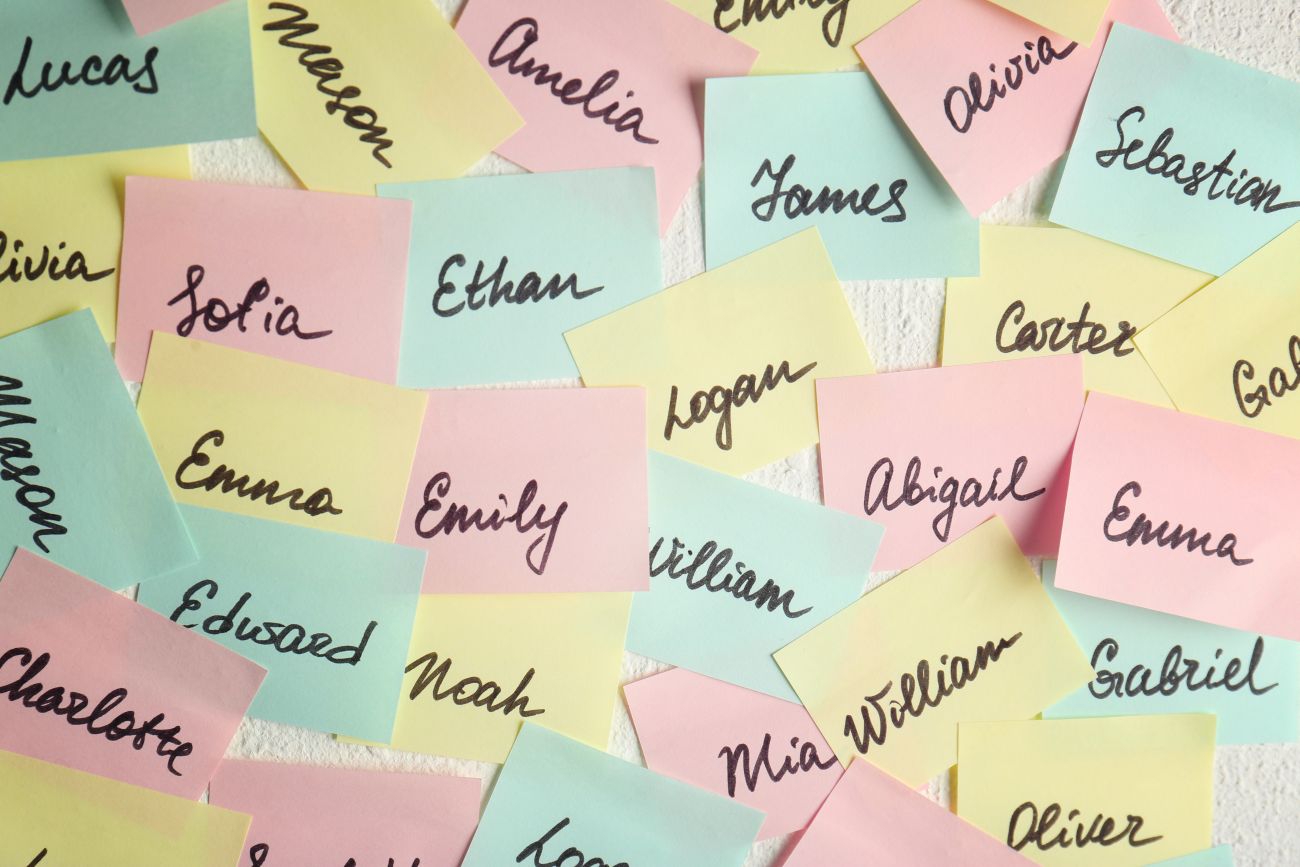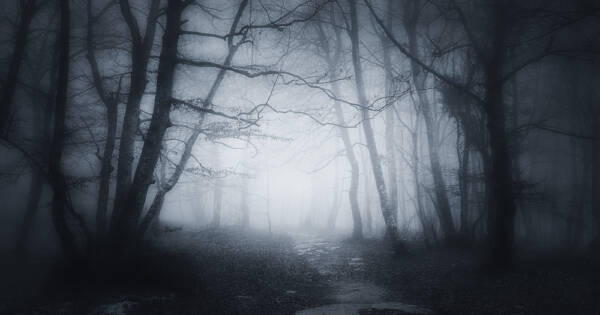While I couldn’t imagine waiting nine months to find out the gender of my baby, there are lots of people who love the excitement of waiting. If you don’t know the gender of your baby, choosing a name can be tricky! This is where gender neutral names come into play. But even if you already know the gender of your baby, unisex names have become a trendy choice for parents.
Are you expecting a child? Whether it’s a boy or a girl, we’ve got you covered! Here is a list of the 25 most popular unisex names based on U.S. data collected by Nameberry. Check it out.
1. Alexis (aa-LEE-ksees)
This gender neutral name is of Greek origin meaning “defender.” While it’s traditionally a boys name, it made the transition to unisex thanks to Alexis Carrington, one of the lead characters on Dynasty, a popular show from the 1980s. Historically, this name dates back to ancient (male) saints, as well as the third century BC comic poet.
Today, it’s more commonly used for girls, but can still be seen as a male name. It even surpassed the female (sister) name, Alexandra, in popularity for a period of time. Between 1994 and 2010 Alexis enjoyed a spot as one of the Top 20 girls names. It has since experienced a slight decline, but fully recovered and is now one of the top unisex names in the U.S.
 FamVeld / Shutterstock
FamVeld / Shutterstock2. Angel (AAn-gehl)
All parents think their baby is a little angel, so why not name them one! Angel might seem like an uncommon name, but it’s actually quite popular and can be used for either a boy or a girl.
Even though Angel is technically a gender fluid name, Nameberry points out that it is actually more often used for Latin males. It’s also a perennial Hispanic boys name that may have increased in popularity thanks to the show Buffy the Vampire Slayer which featured a character by the name of Angel. One celebrity who used this name was Spice Girl Melanie Brown who named her daughter Angel Iris.
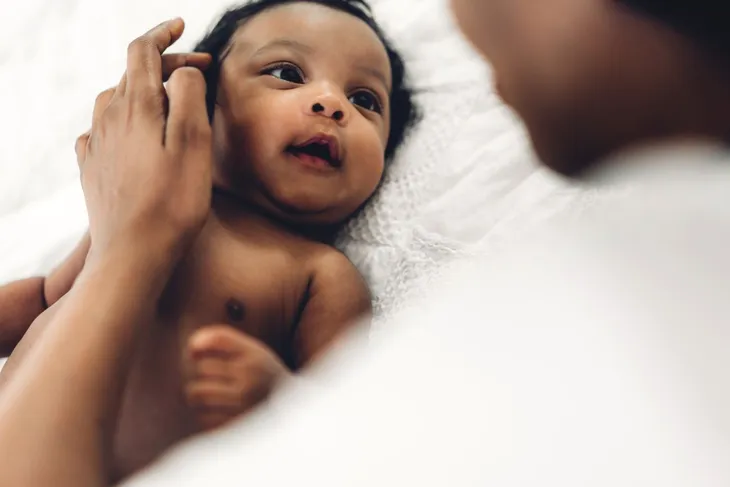 Art_Photo / Shutterstock
Art_Photo / Shutterstock3. Ariel (AIR-yull)
The first thing that comes to mind with this name is likely the red-headed mermaid from Disney’s The Little Mermaid. But Ariel has actually been around long before the animated character. It’s a unisex name of Hebrew origin meaning “lion of God.” Ariel is also a biblical name. It was the name of the messenger of Ezra and used as a symbolic name for the city of Jerusalem. Shakespeare later used it for one of his male characters in The Tempest.
While it might seem like this name is a more popular choice for girls, lately it’s actually been on the rise for boys. However, even with an increased male interest, Nameberry says Ariel still leans more toward the feminine side as it’s used three times more often for girls than it is for boys.
 Oksana Kuzmina / Shutterstock
Oksana Kuzmina / Shutterstock4. Avery (AY-ve-ree)
Avery is the most popular unisex names of all time. It is of English origin meaning “ruler of the elves.” The history of this name dates back to the Middle Ages as a Norman-French pronunciation of the Anglo-Saxon name Alfred and the Ancient Germanic name Alberich, says Nameberry.
While it can be used for both genders, it’s more commonly used for girls. For example, 11,000 babies were named Avery in 2016, and 80-percent of them were female. It moved from #802 in 1990 to just outside the Top 10, and is currently the #1 unisex name in the U.S. In addition to all that, it’s one of the most popular girls’ names starting with the letter “A.”
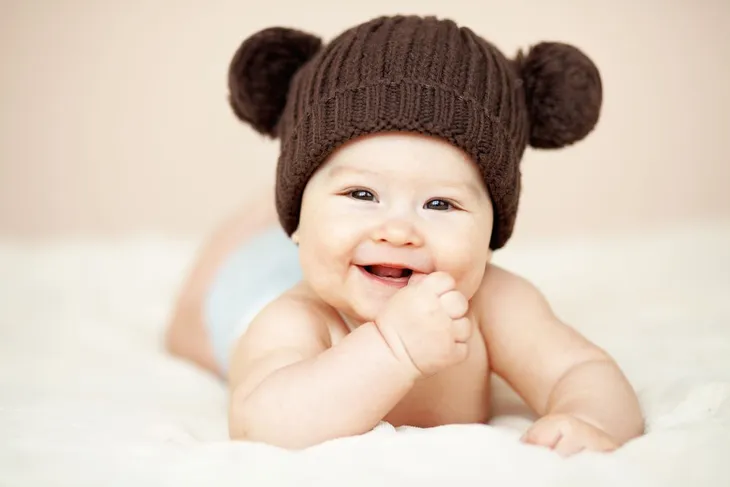 Alena Ozerova / Shutterstock
Alena Ozerova / Shutterstock5. Blake (BLAYK)
Blake is a pretty traditional name. It’s of English origin meaning “fair-haired dark.” It originated as a surname in Britain and until recently, this name was more traditionally associated with boys. This may have been due to the fact that it was the name of the television character Blake Carrington from the widely popular Dynasty series in the 1980s.
Thanks to its long standing history and commonality, Blake is no stranger to popularity. This name was in the Top 100 from 1988 until 2017 when it unexpectedly dropped out for the first time in nearly 30 years. Despite these stats, Blake is still a safe and sophisticated choice for either a girl or a boy.
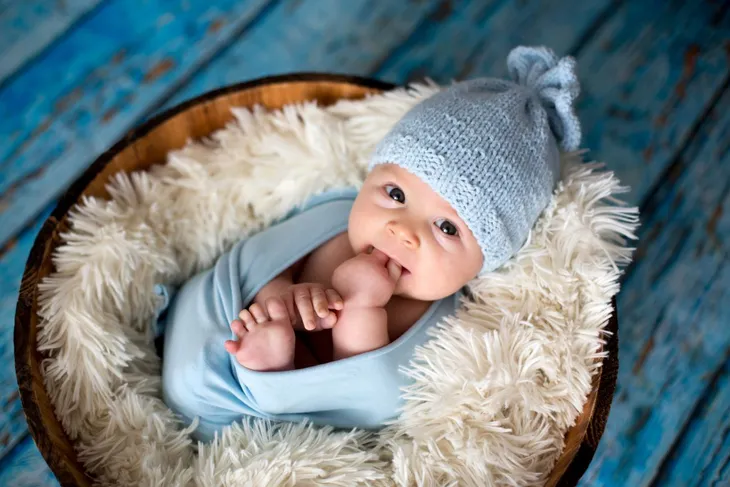 Tomsickova Tatyana / Shutterstock
Tomsickova Tatyana / Shutterstock6. Charlie (CHAHR-lee)
Yet another super traditional name that has been around for a long time. What’s new and trendy about this friendly classic is that it’s now being used for boys and girls! Charlie is the English diminutive of Charles, a German word meaning “free man.” This name became popular in the Middle Ages thanks to Charles the Great, also known as Charlemagne. Another way to spell this name is Charley.
Charlie is such a great name because even though it’s a classic, it’s not overused. After nearly 50 years in hibernation, this name reappeared in 2005 and has been slowly climbing the charts ever since. It was only a few years ago that Charlie became well recognized as a unisex name and in 2015, for the first time ever, Charlie began ranking higher on the girls list than the boys.
 Oksana Kuzmina / Shutterstock
Oksana Kuzmina / Shutterstock7. Dakota (duh-KOH-tuh)
Dakota has been a popular “place name” since the nineties. This is a growing trend that allows parents to name their children after various states and cities. Dakota comes from Native American people in northern Mississippi Valley. Its meaning translates to “friendly one.” Dakota wins for being one of the first trendy western place-names.
Even though Dakota isn’t as popular as some of the other names on this list, it’s still one of the top unisex names in the U.S. and is equally as popular for boys as it is for girls, so it’s a safe choice no matter what the gender is!
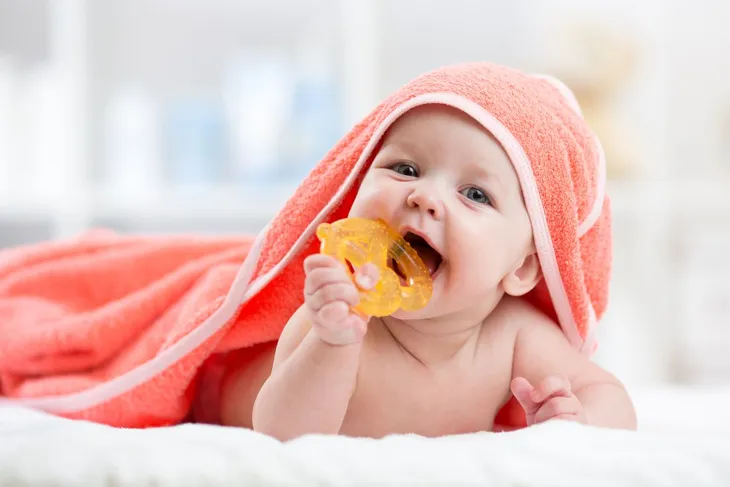 Oksana Kuzmina / Shutterstock
Oksana Kuzmina / Shutterstock8. Eden (ED-en or EE-den)
Eden is such a beautiful name that radiates feelings of peace and serenity. The origin of this name is Hebrew, meaning “place of pleasure, delight.” Thanks to it’s Biblical background, it’s also a part of the place name trend. Not only does it allude to Paradise, but it is also one of several place names taken from the Bible by Puritans in the seventeenth century.
While it might seem like a feminine name and is no doubt more commonly used for girls, in recent years this name has been gaining a lot of popularity with boys. However, the scales are still skewed more favorably for girls. For every four girls with this name there is one boy, says Nameberry.
 Natalia Kirichenko / Shutterstock
Natalia Kirichenko / Shutterstock9. Elliott (EH-lee-uht)
I didn’t realize Elliot was a unisex name until I came across it on Nameberry! The meaning behind this name is “Jehovah is God.” While Elliott (also sometimes spelled Elliot) is a well-established boys name, it is also sometimes used for girls. The trend may have started after the nickname “Ellie” became popular for girls.
In addition to being a common unisex name, Elliott is one of the most popular boy names. In 2019, it ranked at #173 for boys, whereas for girls it lands somewhere in the 500s.
 Olesia Bilkei / Shutterstock
Olesia Bilkei / Shutterstock10. Emerson (EH-mer-suhn)
Emmerson is a gender neutral name that even I have noticed gaining a lot of popularity in the past few years. This name is of German origin meaning “son of Emery.” This name may have emerged due to the long standing interest in other names that begin with “Em” such as Emily and Emma.
Desperate Housewives star Teri Hatcher seems to have got the ball rolling back in 1997 when she took this previously well established boys name and used it for her daughter. Other celebrities like Shonda Rhimes have followed suit, and today it ranks as one of the most popular unisex names starting with the letter “E.”
 javi_indy / Shutterstock
javi_indy / Shutterstock11. Emery (ehm-ree)
Emery is of German origin meaning “industrious.” As you can see, names that begin with the letter “E” are peaking in interest, particularly those that begin with “Em.” The highest ranking name is Emma which has been the most popular girl name for several years. We think Emery may have emerged as a new spin on these other popular names that are now overused like Emma, Emily, Emilia, and other new versions like Emerson and Emmeline.
Despite it being a new trend, Emery has been around for at least a decade. It enjoyed a boost on the charts in 2009 after Angie Harmon and Jason Sehorn used it for one of the daughters. Today, Emery ranks as one of the Top 1000 names for both boys and girls. When it comes to girls, Emery sits in the Top 100, whereas for boys it’s down in the 700s.
 FamVeld / Shutterstock
FamVeld / Shutterstock12. Finley (FIN-lee)
Finley is a Scottish, Irish name that means “fair-haired hero.” In Scotland, Finley is a royal name because it belonged to Macbeth’s father.
Similar to some of the other gender neutral names on this list, it was previously thought of as strictly a male name before celebrities starting using it for girls. For example, Jason Sehorn and Angie Harmon named their daughter Finley, as well as Lisa Marie Presley. Today, Finley is one of the most popular unisex names. In addition to it being gender neutral, parents can also have a little fun with the spelling. For example it can be spelt Finleigh, Finlay, Finn, and of course, there’s the option of Finnegan.
 FamVeld / Shutterstock
FamVeld / Shutterstock13. Hayden (HEY-dun)
Hayden is of English origin meaning “heather-grown hill.” Unlike some of the other names on this list, Hayden is a relatively new name. In fact, until recently this name was considered very obscure and unusual. The success of this name is likely due to other popular names like Brayden and Caden which were previously used for boys. Hayden was introduced as a more feminine or gender neutral option. It’s also very similar sounding to other names like Jaiden, Braden, Aidan, and all those endless variations.
Another reason this name may be peaking in interest is because of Hayden Panettiere, the lead actress in both Heroes and Nashville. Other celebrities with this name are Star Wars star Hayden Christensen or for musical parents, it could be thanks to the composer Haydn (pronounced HI-den).
 Alena Sli / Shutterstock
Alena Sli / Shutterstock14. Jordan (JAWR-duhn)
While Jordan is more commonly used for boys, the scales are beginning to tip in favor of girls now that parents are beginning to choose more “tomboy” names for their little girls. According to Nameberry, this name saw a surge in popularity during the heyday of professional basketball player, Michael Jordan. It was one of the leading androgynous names of the nineties. Even now thirty years later, it’s still one of the most popular unisex names.
If you’d like a name that has an interesting story behind it, then this is the name for you! Jordan is of Hebrew origin meaning “flowing down.” The name Jordan was given to anyone baptized in holy water brought back by Crusaders from the River Jordan, the only river in Palestine. It’s also the river Christ was baptized in by John the Baptist.
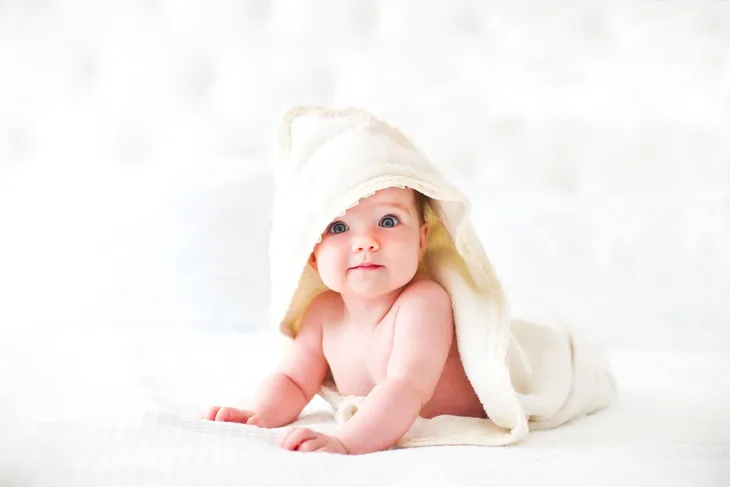 Dasha Petrenko / Shutterstock
Dasha Petrenko / Shutterstock15. Karter (Kar-ter)
This name is also sometimes spelt with a “C” as “Carter” which has been a consistent choice for parents of boys. It has been in the Top 1000 boy names since 2005. In 2014, a new version of this name was introduced as Karter cracked the Top 1000 names for girls and has been there ever since.
Karter is of English origin meaning “transporter of goods by cart.” This name is commonly chosen by parents who love the name “Carter” but want to put their own modern (or more feminine) twist on it.
 Tanya Yatsenko / Shutterstock
Tanya Yatsenko / Shutterstock16. London (LUHN-duhn)
While I’ve never met anyone with this name, I’m actually loving the idea and apparently I’m not the only one because it’s listed as one of Nameberry’s top unisex names! Of course, the name is of English origin and is what we call a “place name.” The idea of using places for names has been around for a long time and always been considered a trendy move by parents.
While London can be used for either gender, it tends to be slightly more popular for girls. Not surprisingly, this name is quite uncommon in the UK, but has been used plenty by Americans.
 Tursk Aleksandra / Shutterstock
Tursk Aleksandra / Shutterstock17. Morgan (MORE-gun)
Morgan sounds more like a surname than a given name, but that’s what makes it really trendy. This name is of Welsh origin meaning “sea-born, sea-song or sea-circle.” Morgan is considered a very traditional Welsh male name which came from the Old Welsh name Morcant. The female version of this name is totally unrelated. When used for females, it comes from Arthurian legend created for Morgan le Fay, King Arthur’s half-sister.
This name has a lot of history behind it, but in America, Morgan is generally used for girls than boys due to its trendiness, not its traditional Welsh background. This name shot up during the 1990s when it landed in the Top 25. It’s since dropped down, but continues to be a sophisticated choice for both genders.
 ANNA GRANT / Shutterstock
ANNA GRANT / Shutterstock18. Parker (PAR-kur)
Another name of English origin meaning “park keeper,” Parker is becoming a very trendy unisex name. It was put on the map by indie actress Parker Posey who took this common surname and turned it into a lovely feminine given name.
Nameberry does point out that Parker is about three times more common for boys than it is for girls, but nonetheless it is on the rise for both genders. It’s one of the Top 100 names for boys.
 Katrina Era / Shutterstock
Katrina Era / Shutterstock19. Peyton (pai-tUHN)
Peyton is of English origin meaning “fighting-man’s estate.” Despite its masculine meaning, Peyton is a popular unisex name. We expected to see this name drop off since it’s peak in the ’90s, but it’s maintained its rank throughout the years. We think this may have to do with its traditional southern roots.
In 2019, Peyton broke through the Top 100 for girl names at #98, but sits somewhere in the 400’s for boys. On Nameberry’s unisex list, it’s the #6 unisex name in the U.S.
 Africa Studio / Shutterstock
Africa Studio / Shutterstock20. Quinn (KWIN)
Quinn is a strong Irish name meaning “descendant of Conn, chief leader, intelligence.” Nameberry also lists it as the Anglicized version of the Irish patronymic surname Ó Cuinn. It is a well recognized name in Ireland as one of the most notable clans from County Tyrone in Northern Ireland.
While it’s no doubt a strong, masculine name, this Celtic surname is becoming more popular among the ladies! In fact, nowadays this name is more commonly seen in girls than it is in boys. This may have been encouraged with the help of female characters on television like on Glee, as well as the MTV show Daria and Zoey 101.
If you like the sound of this name but aren’t quite sold on it, try other variations like Quinton, Quincy, or Finn.
 Impact Photography / Shutterstock
Impact Photography / Shutterstock21. Riley (RYE-lee)
Once we learned the special meaning behind this name, its popularity immediately made sense! Riley is of Irish origin meaning “courageous.” How cute is that? It originated as an Irish and English surname, but now transitioned into a given name. The Irish version of this name is Reilly, a surname which is a variation of the given name Raghailleach.
While it’s one of the most popular unisex names in the U.S. right now, in the past it was more commonly used for boys. This is quickly changing. Riley is now rising faster for girls than it is for boys. To make this name more feminine, some parents spell it as Rylee, Ryleigh, or as we previously mentioned, as the traditional Reilly. Either way, it’s one of the most popular contemporary unisex names.
 Pshenina_m / Shutterstock
Pshenina_m / Shutterstock22. River (RIVER)
Attention nature lovers! Like the ebb and flow of water, River has experienced the highs and lows of trending nature names. River is of English origin and can be used for both girls and boys. Although we must admit, traditionally it’s more often used for boys. However, this is changing! Kelly Clarkson used this name for her daughter River which helped increase recent interest.
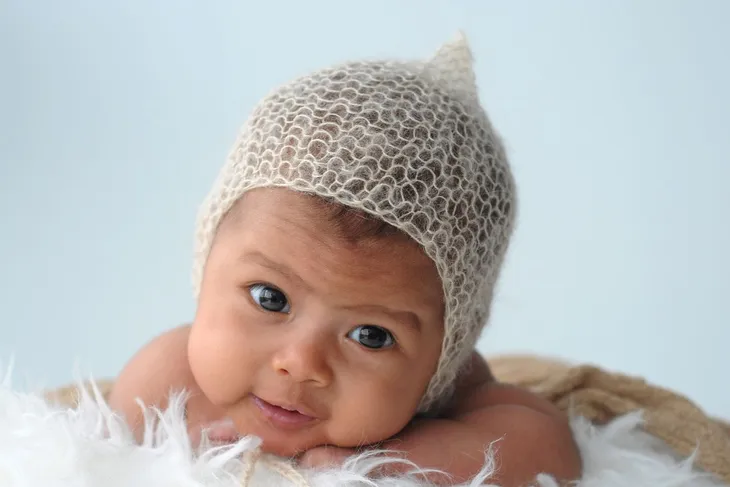 buttet / Shutterstock
buttet / Shutterstock23. Rowan (ROH-en)
Rowan is such a cute and unique name that somehow also seems really traditional. Rowan is of Scottish, Irish origin meaning “little redhead,” so if your baby has red hair, then this is the name for him or her! The meaning behind this name comes from the tree (commonly found in Scotland) that grows red berries. Scholars don’t quite agree on when this name first originated as some believe it’s been used since the Middle Ages, but Rowan hasn’t been found in any literature until modern times.
In the U.S., Rowan is mostly used for boys, but this changed in 2003 when Brooke Shields named her daughter Rowan. That same year, it entered the Top 1000 baby names and has now become a popular choice for both genders. However, it is still more commonly used for boys than girls.
 Rido / Shutterstock
Rido / Shutterstock24. Sawyer (SAW-yuher)
Sawyer is a strong but friendly name which makes sense because of it’s southern charm. It’s got that southern hospitality! According to Nameberry, this name is considered an “occupational name” because it’s of English origin meaning “woodcutter.” It’s currently the 6th most popular unisex name listed on the website and sits just outside the Top 100 at #106 for boy names.
This name was used by Sara Gilbert, co-host of The Talk and current star of The Connors, as well as Diane Farr. Both used this name for their daughters. If you like it for a boy, don’t fret! It gained male recognition after Kate Capshaw and Steven Spielberg used it for their son in 1992. In fact, they may have been the ones to start this trend because soon after it soared up 356 places on the charts.
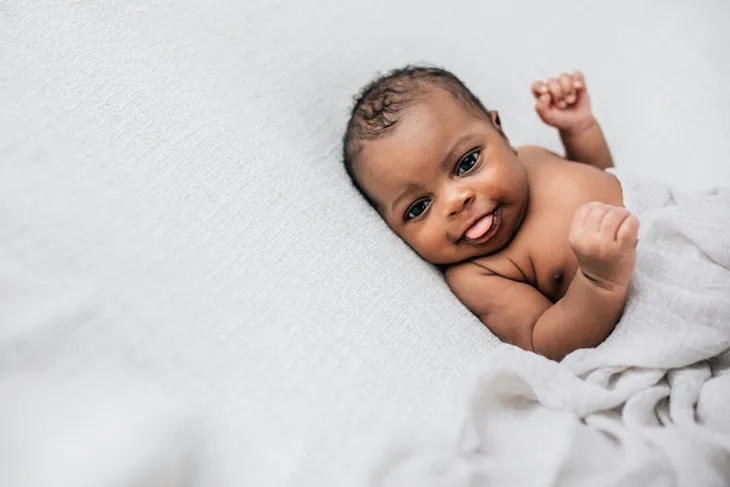 Ursula Page / Shutterstock
Ursula Page / Shutterstock25. Taylor (t-AI-ler)
Taylor is a pretty traditional unisex name. Similar to Sawyer, Taylor is referred to as an “occupational name” because its meaning is “tailor.” While this name might seem like it’d be more popular among boys, it’s actually a female favorite. It was the ninth most popular girls name throughout the 1990s. Despite its popularity for girls, Taylor was also a common choice for boys. It almost cracked the Top 50 boy names in the mid-1990s.
While this name has decreased in popularity since its peak in the nineties, popular celebrities like Taylor Swift are keeping this name alive and well! It’s also the name of lead actress in Netflix’s Orange is the New Black, Taylor Schilling, as well as the daughter of Garth Brooks.
 Sergey Nivens / Shutterstock
Sergey Nivens / Shutterstock